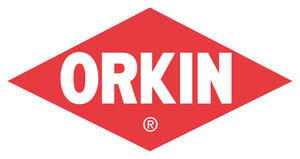
ATLANTA, March 7, 2013 /PRNewswire/ -- According to pest control leader Orkin, this is the season for termite swarms in the southeast U.S. When temperatures are consistently above freezing, termites often swarm inside homes before moving outdoors to search for food and water. The Orkin experts have developed answers to consumers' top five questions.
"All termites require four things to survive—food, moisture, shelter and optimal temperature," said Matt Peterson, Orkin's Southeast Division technical manager. "Wood building materials in and around homes can provide the food, while moisture can come from air conditioners or standing water from landscape grading. Mud tubes act as a protective tunnel and keep termites moist. Those tubes are about the size of a pencil and usually run vertically on the inside or outside of a building's foundation."
Q: Are termites only active in the spring and summer?
A: No, even though termites are most visible in the spring, they can damage property year-round. According to the National Pest Management Association, termites cause about $5 billion in damage per year in the U.S.
Q: What is a termite swarm, and if I see one, does that mean I have a termite problem?
A: Swarmers, also known as the "reproductives" of the colony, are termites that come out each year to start new colonies. They usually leave the nest in the spring. Colonies do not typically start producing swarming termites until the colony is fairly mature and has more than likely been established for a while. If people see a swarm of termites inside their home, that could be a sign that termites have been there for at least five to seven years.
Q: How can you tell the difference between a termite and a flying ant?
A: Although termite swarmers and flying ants can be easily confused, homeowners should not assume swarms are groups of flying ants. Termites are found in every state except Alaska and thrive in warm and damp, humid climates. This is a good example of why it is important to partner with a professional pest management company. They can help homeowners determine what type of pest they have and develop a customized approach to a treatment plan and solution. Another difference is that ants typically swarm in the summer, while termites generally swarm right at the onset of spring when winter is ending.
Q: I do not see any signs of termites, so do I need to worry about a preventive plan?
A: Warning signs can be subtle and often go unnoticed until structural damage has already occurred. Signs of an infestation can include termite swarms, mud tubes and piles of discarded wings. After the termites swarm, which is typically during warm spring days, they can shed their wings and leave piles of them behind. Anywhere around your home where it is in contact with the soil can be a potential termite entrance.
Q: What else can homeowners do to prevent a termite problem?
A: Orkin advises homeowners to keep gutters clear, and direct water from downspouts away from your home. Also, do not pile mulch or allow soil to accumulate against your home's siding. This could provide access for termites to enter your home. Finally, pay close attention to dirt-filled porches and crawlspaces. Termites could have easy access to wood through cracks in foundation walls or if wood is in contact with the soil.
"Termites can fit through cracks as thin as a business card, which is about 1/32 of an inch," added Peterson. "Proper maintenance and partnering with a pest management professional is crucial to finding and fixing problem spots around your home."
About Orkin, LLC
Founded in 1901, Atlanta-based Orkin is an industry leader in essential pest control services and protection against termite damage, rodents and insects in the United States, Canada, Europe, Central America, the Middle East, the Caribbean, Asia, the Mediterranean and Africa. With more than 400 locations, Orkin's almost 8,000 employees serve approximately 1.7 million customers. The company serves homeowners and numerous industries, including food and beverage processing, foodservice, hospitality, healthcare, retail, warehousing, property/facilities management, schools and institutions. Orkin is proud to be recognized by the National Pest Management Association as a QualityPro and GreenPro-certified company, addressing not only our customer's pest control needs, but also their concern for protecting the environment. Learn more about Orkin at http://orkin.com. Orkin is a wholly-owned subsidiary of Rollins Inc. (NYSE: ROL).
CAUTION CONCERNING FORWARD-LOOKING STATEMENTS
This release contains statements that constitute "forward-looking statements" within the meaning of the Private Securities Litigation Reform Act of 1995. These forward-looking statements include statements about the Company's belief that an early termite season could occur. Actual occurrences could differ materially from those indicated by the forward-looking statements because of various risks and uncertainties, including without limitation, climate and weather trends. All of the foregoing risks and uncertainties are beyond the ability of the Company to control, and in many cases the Company cannot predict the risks and uncertainties that could cause its actual results to differ materially from those indicated by the forward-looking statements. A more detailed discussion of potential risks facing the Company can be found in the Report on Form 10-K of Rollins, Inc. filed with the Securities and Exchange Commission for the year ended December 31, 2012.
Media Contacts:
Addy Apesos
Orkin
404.888.2318
Sarah Robinson
Orkin
404.888.2917
SOURCE Orkin, LLC






Share this article